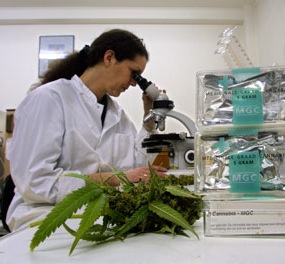
A group of scientists have published a new report online in the medical journal Nature Reviews Neuroscience, calling for additional research to be performed on various illegal drugs and describing the bans on these drugs as scientific censorship. The researchers say that such drugs, including psychedelics and marijuana, may have incredible efficacy in treating various physical and mental heath conditions, but that restrictive laws prevent the scientific community from fully understanding exactly how and to what extent.
Many of these drugs are considered “Schedule 1″ under U.S. law, meaning that they’re thought to have no medical use and a high potential for abuse. Could drugs once considered strictly recreational and dangerous actually hold the keys to a new era of safer, more effective medical treatment?
Powerful Drugs, Illegal for Now
Dr. David Nutt, one of the co-authors of the new report, thinks so. Nutt, a psychopharmacologist at London, England’s Imperial College, says that laws passed throughout the Western world in the 1960s and 70s were aimed at preventing recreational drug use and subsequent harm, but they primarily served to limit important research instead. Essentially, Nutt believes that further research on banned drugs such as MDMA, better known as Ecstasy, cannabis, better known as marijuana, and psychedelics such as LSD and psilocybin, the active ingredient in “shrooms” or “magic mushrooms,” could reveal their powerful beneficial medical effects, as well as dispel the notion that using these drugs in even a limited capacity is dangerous.
Nutt explains that the aforementioned drugs were made illegal via United Nations treaties in 1988, 1971 and 1961. These treaties made the drugs illegal not only for recreational consumers, but for medical and scientific researchers as well, effectively ending the possibility of further scientific inquiry.
Unexplored Medical Benefits
Up until the bans, many scientific studies found that drugs such as MDMA, cannabis and LSD actually have very real therapeutic effects, at least in certain cases. History indicates that cannabis has been used therapeutically for thousands of years, with medical uses including pain reduction, muscle spasticity relief, inflammation mitigation and more. Cannabis is also believed to be effective for mitigating some of the worst symptoms of cancer, multiple sclerosis and AIDS, and a more recent study even indicates that regular marijuana users are less likely to develop Type 2 diabetes than the general population, even though they consume more calories per day on average.
Meanwhile, psychedelics such as LSD and psilocybin have been used to treat alcoholism and chronic migraine headaches, while MDMA may be effective in treating depression and post-traumatic stress disorder, or PTSD.
Finally, Nutt believes that limiting the study of these currently-illegal drugs also limits our ability to fully understand the human brain and consciousness. This is because psychedelic drugs alter the conscious state, potentially having implications on a host of mental health issues and disorders.
Research is Difficult, but Improvements May Come
According to Nutt, it’s very difficult to study drugs such as cannabis, psilocybin and LSD because it’s equally difficult to obtain them legally. This holds especially true for artificially synthesized drugs; a Boston company produces pure, synthesized psilocybin for research purposes, but most research labs can’t afford quantities large enough for any substantial research because the drug costs $12,000 for a single gram.
Still, Nutt has hope for the future. In general, popular support for the “war on drugs” is fading quickly as many argue that law enforcement should focus more on violent crime, and treat and rehabilitate drug addicts rather than jail them. In addition, while cannabis is still illegal at the federal level, a total of 17 states current allow citizens to use marijuana for medical purposes, and Washington and Colorado allow the outright use of marijuana regardless of medical necessity. Additional states are expected to allow voters to decide on such laws in upcoming elections.
The Bottom Line
Scientists from the U.K. are saying that illegal drugs such as marijuana, LSD and Ecstasy may have enormous medical potential, but until their legal status is changed, it will be nearly impossible to do the research necessary to explore this potential.














Wow! Such an amazing and helpful post this is. I really really love it. It’s so good and so awesome. I am just amazed. I hope that you continue to do your work like this in the future also.
I have read so many posts about the blogger lovers however this post is really a good piece of writing, keep it up
Hey, great blog, but I don’t understand how to add your site in my rss reader. Can you Help me please?
Great Information sharing .. I am very happy to read this article .. thanks for giving us go through info.Fantastic nice. I appreciate this post.
Hi, I log on to your new stuff like every week. Your humoristic style is witty, keep it up